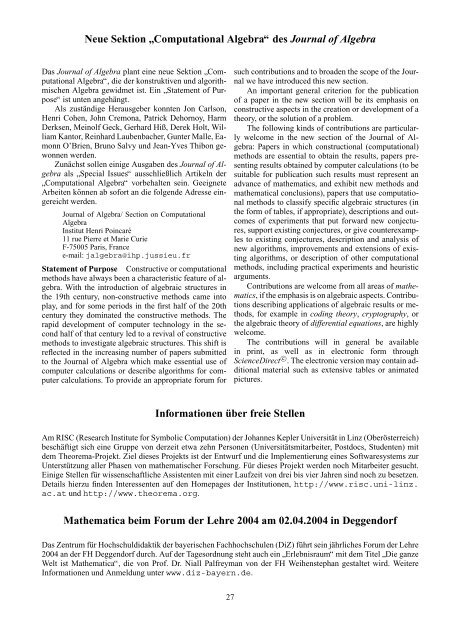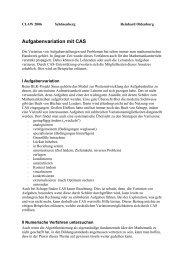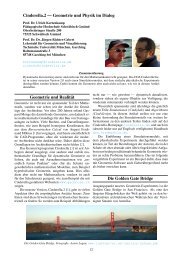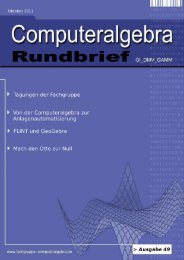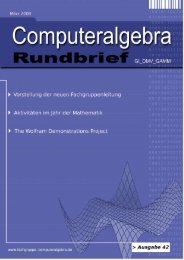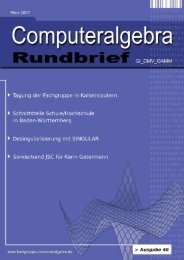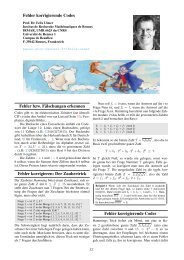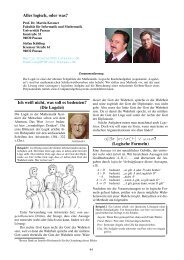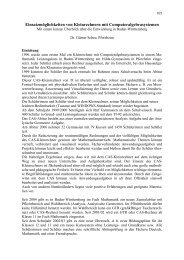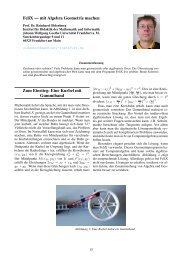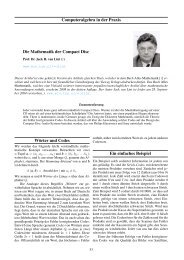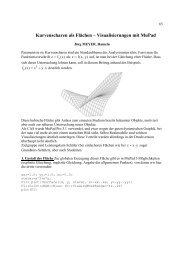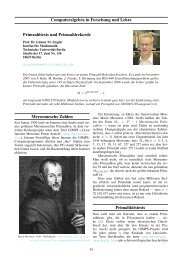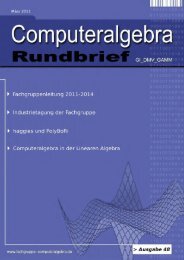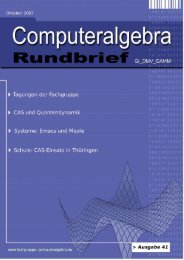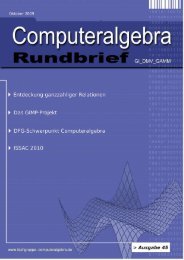Computeralgebra-Rundbrief - Fachgruppe Computeralgebra
Computeralgebra-Rundbrief - Fachgruppe Computeralgebra
Computeralgebra-Rundbrief - Fachgruppe Computeralgebra
Sie wollen auch ein ePaper? Erhöhen Sie die Reichweite Ihrer Titel.
YUMPU macht aus Druck-PDFs automatisch weboptimierte ePaper, die Google liebt.
Neue Sektion ” Computational Algebra“ des Journal of Algebra<br />
Das Journal of Algebra plant eine neue Sektion Com-<br />
”<br />
putational Algebra“, die der konstruktiven und algorithmischen<br />
Algebra gewidmet ist. Ein Statement of Pur-<br />
”<br />
pose“ ist unten angehängt.<br />
Als zuständige Herausgeber konnten Jon Carlson,<br />
Henri Cohen, John Cremona, Patrick Dehornoy, Harm<br />
Derksen, Meinolf Geck, Gerhard Hiß, Derek Holt, William<br />
Kantor, Reinhard Laubenbacher, Gunter Malle, Eamonn<br />
O’Brien, Bruno Salvy und Jean-Yves Thibon gewonnen<br />
werden.<br />
Zunächst sollen einige Ausgaben des Journal of Algebra<br />
als Special Issues“ ausschließlich Artikeln der<br />
”<br />
” Computational Algebra“ vorbehalten sein. Geeignete<br />
Arbeiten können ab sofort an die folgende Adresse eingereicht<br />
werden.<br />
Journal of Algebra/ Section on Computational<br />
Algebra<br />
Institut Henri Poincaré<br />
11 rue Pierre et Marie Curie<br />
F-75005 Paris, France<br />
e-mail: jalgebra@ihp.jussieu.fr<br />
Statement of Purpose Constructive or computational<br />
methods have always been a characteristic feature of algebra.<br />
With the introduction of algebraic structures in<br />
the 19th century, non-constructive methods came into<br />
play, and for some periods in the first half of the 20th<br />
century they dominated the constructive methods. The<br />
rapid development of computer technology in the second<br />
half of that century led to a revival of constructive<br />
methods to investigate algebraic structures. This shift is<br />
reflected in the increasing number of papers submitted<br />
to the Journal of Algebra which make essential use of<br />
computer calculations or describe algorithms for computer<br />
calculations. To provide an appropriate forum for<br />
Informationen über freie Stellen<br />
such contributions and to broaden the scope of the Journal<br />
we have introduced this new section.<br />
An important general criterion for the publication<br />
of a paper in the new section will be its emphasis on<br />
constructive aspects in the creation or development of a<br />
theory, or the solution of a problem.<br />
The following kinds of contributions are particularly<br />
welcome in the new section of the Journal of Algebra:<br />
Papers in which constructional (computational)<br />
methods are essential to obtain the results, papers presenting<br />
results obtained by computer calculations (to be<br />
suitable for publication such results must represent an<br />
advance of mathematics, and exhibit new methods and<br />
mathematical conclusions), papers that use computational<br />
methods to classify specific algebraic structures (in<br />
the form of tables, if appropriate), descriptions and outcomes<br />
of experiments that put forward new conjectures,<br />
support existing conjectures, or give counterexamples<br />
to existing conjectures, description and analysis of<br />
new algorithms, improvements and extensions of existing<br />
algorithms, or description of other computational<br />
methods, including practical experiments and heuristic<br />
arguments.<br />
Contributions are welcome from all areas of mathematics,<br />
if the emphasis is on algebraic aspects. Contributions<br />
describing applications of algebraic results or methods,<br />
for example in coding theory, cryptography, or<br />
the algebraic theory of differential equations, are highly<br />
welcome.<br />
The contributions will in general be available<br />
in print, as well as in electronic form through<br />
ScienceDirect c○ . The electronic version may contain additional<br />
material such as extensive tables or animated<br />
pictures.<br />
Am RISC (Research Institute for Symbolic Computation) der Johannes Kepler Universität in Linz (Oberösterreich)<br />
beschäftigt sich eine Gruppe von derzeit etwa zehn Personen (Universitätsmitarbeiter, Postdocs, Studenten) mit<br />
dem Theorema-Projekt. Ziel dieses Projekts ist der Entwurf und die Implementierung eines Softwaresystems zur<br />
Unterstützung aller Phasen von mathematischer Forschung. Für dieses Projekt werden noch Mitarbeiter gesucht.<br />
Einige Stellen für wissenschaftliche Assistenten mit einer Laufzeit von drei bis vier Jahren sind noch zu besetzen.<br />
Details hierzu finden Interessenten auf den Homepages der Institutionen, http://www.risc.uni-linz.<br />
ac.at und http://www.theorema.org.<br />
Mathematica beim Forum der Lehre 2004 am 02.04.2004 in Deggendorf<br />
Das Zentrum für Hochschuldidaktik der bayerischen Fachhochschulen (DiZ) führt sein jährliches Forum der Lehre<br />
2004 an der FH Deggendorf durch. Auf der Tagesordnung steht auch ein ” Erlebnisraum“ mit dem Titel ” Die ganze<br />
Welt ist Mathematica“, die von Prof. Dr. Niall Palfreyman von der FH Weihenstephan gestaltet wird. Weitere<br />
Informationen und Anmeldung unter www.diz-bayern.de.<br />
27


